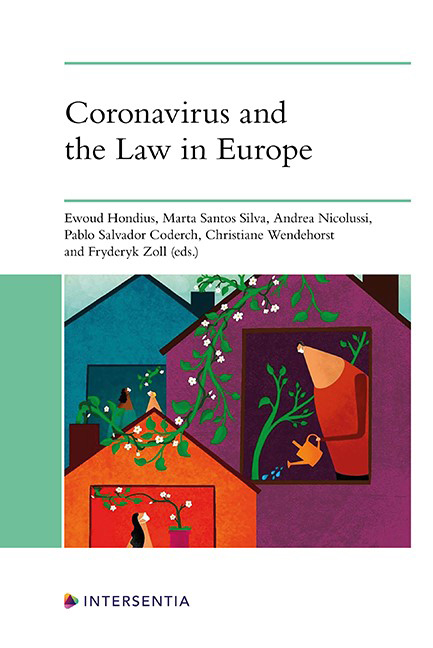Book contents
- Frontmatter
- Preface
- Contents
- List of Keywords
- List of Contributors
- PART I COVID-19 AND FUNDAMENTAL RIGHTS
- PART II STATES AGAINST THE PANDEMIC
- PART III COMPENSATION FOR COVID-19 RELATED DAMAGE
- PART IV CONTRACT LAW
- PART V CONSUMER LAW
- PART VI LABOUR AND SOCIAL LAW
- PART VII CORONAVIRUS CHANGING EUROPE
- Epilogue
- Annex: ELI Principles for the COVID-19 Crisis
- About the Editors
The Potential of the COVID-19 Crisis to Cause Legal “Disruption” to Contracts and Contract Law
Published online by Cambridge University Press: 10 December 2021
- Frontmatter
- Preface
- Contents
- List of Keywords
- List of Contributors
- PART I COVID-19 AND FUNDAMENTAL RIGHTS
- PART II STATES AGAINST THE PANDEMIC
- PART III COMPENSATION FOR COVID-19 RELATED DAMAGE
- PART IV CONTRACT LAW
- PART V CONSUMER LAW
- PART VI LABOUR AND SOCIAL LAW
- PART VII CORONAVIRUS CHANGING EUROPE
- Epilogue
- Annex: ELI Principles for the COVID-19 Crisis
- About the Editors
Summary
This contribution explores whether the COVID-19 crisis has the potential to cause legal disruption to the legal regime for contracts. It first sketches features of the COVID-19 crisis and its effect on the economic and social context of contracts, before setting out a four-step methodology to categorise legal responses to the crisis. It then develops a specific conception of legal disruption, based on Christensen’s theory of disruptive technology, which posits that legal disruption occurs once the pre-crisis legal regime for contracts (whether entirely or partially) is displaced by new provisions first targeted at the effects of the crisis. It concludes that the crisis has the potential to cause legal disruption but that this outcome is not inevitable.
SETTING THE SCENE: COVID-19, DISRUPTION AND WHAT IS DIFFERENT
The first half of 2020 was unprecedented in the way the COVID-19 pandemic changed economic and social activities: many businesses were forced to suspend their activities altogether or modify their operations in accordance with social distancing requirements; home-working and home-studying instantly replaced face-to-face activities, and video-conferencing became the alternative to face-to-face meetings. Consumers had to deal with multiple changes at once: many suffered a reduction or complete loss of their income; activities already booked and paid for (such as travel or concerts) were cancelled; and many everyday retail shops had to close for a long period of time. Social activities in cafes, bars and restaurants ceased altogether. Many businesses and consumers have been faced with the economic consequences of the pandemic: for businesses pressures came from preserving their cash-reserves in the face of business disruptions and demands from consumers for refunds; for consumers, recovering prepayments for services which would no longer be provided and having to maintain regular payments for rent, mortgages and loans became challenges. Undoubtedly, the COVID-19 pandemic has caused a huge amount of disruption to daily life.
This contribution focuses on a different kind of disruption: the disruptive effect of the COVID-19 pandemic on law, particularly on contracts and contract law. “Disruption” has become a popular, and perhaps over-used, term in recent times thanks to the impact of digital technology on contract law and other areas of law.
- Type
- Chapter
- Information
- Coronavirus and the Law in Europe , pp. 1091 - 1110Publisher: IntersentiaPrint publication year: 2021



